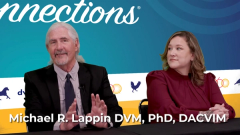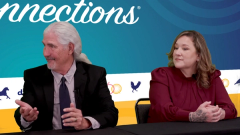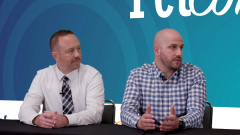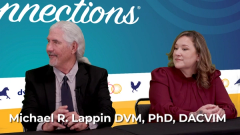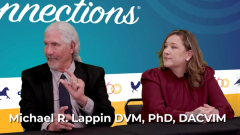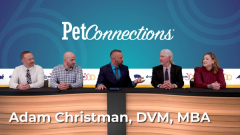
Looking into the future of Parvo treatment
How monoclonal antibodies like CPMA can help change the future of veterinary medicine
Episodes in this series

Sponsored by Elanco Animal Health
Adam Christman, DVM, MBA
Well, this has been fantastic, my friends. So I'm curious to get your final thoughts moving forward, where do we see, you know, the treatment of parvo virus coming into play six months a year down the road, Dr Pachel.
Christopher Pachel, DVM, DACVB, CABC
So I'm thrilled to be included in the front line on this, to be able to bring a behavioral perspective to the conversation to include that education and to be a part of the conversation. And so I'm looking to my colleagues here to say, "Cool, what are you going to do," because I'm going to see the results of it. And I'm really hopeful that it really does impact the clinics, the staff, the shelters in the way that we're looking for. I have confidence that it will, and I'm really excited to see that coming down the pipeline.
Erik Zager, DVM, DACVECC
I think that it is exciting, especially, as a monoclonal antibody therapy. You see in human medicine how much those have exploded across the scene, and hopefully with the success of this, we get to see even more success for other diseases in the future. But I think that just being able to empower our team to have new tools against this fight—that is not a fun fight in any way, shape, or form— anything new in the arsenal is just so exciting.
Fathom Woods
I think it will decrease the fear in a lot of shelter staff and owners, because you get in a shelter, and especially one with limited resources, and they have Parvo and everybody just freaks out. But now with this, it's going to be less scary, I think. And that's huge, especially for the owners, to see that their puppy is most likely going to make it.
Michael Lappin, DVM, PhD, DACVIM
Yeah, and as I've mentioned already in this roundtable, I think it's destined to succeed if it's a Parvo puppy, and it's administered in the best window. So what I'm excited about for this next time period, as it goes through conditional licensure to full licensure is learning more about when is that optimum time. We know from an experimental study how it performed, but we don't know when the Parvo puppy was actually infected with Parvo or the dose. And so I think as we learn more over this next year, and I'm looking forward to next year's roundtable to talk about those kinds of things, I look forward to the company gathering more information over this time to learn where's the best window. And are there simple ways that we might actually be able to test to predict the best window and look forward to discussing all those great successes at the next roundtable.
Adam Christman, DVM, MBA
Yeah, absolutely. Well, this has been a great discussion. I want to wrap up with a huge thanks to our panelists, Dr Mike Lappin, Dr. Erik Zager, Dr Chris Pachel, and Fathom woods. We covered a lot of ground today and I truly appreciate the insight from all of you. So thank you so much for being here. This has been wonderful and of course, thank you to Elanco Animal Health for making today's panel discussion possible. On behalf of dvm360, thank you so much for watching and take care everybody.
Newsletter
From exam room tips to practice management insights, get trusted veterinary news delivered straight to your inbox—subscribe to dvm360.

